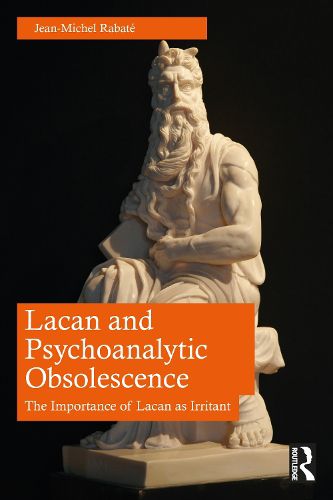Readings Newsletter
Become a Readings Member to make your shopping experience even easier.
Sign in or sign up for free!
You’re not far away from qualifying for FREE standard shipping within Australia
You’ve qualified for FREE standard shipping within Australia
The cart is loading…






This book explores the importance of Lacan's role as an irritant within psychoanalysis, and how Freud and Lacan saw that as key to ensuring that psychoanalysis remained fresh and vital rather than becoming obsolescent.
Drawing on Freud's thinking as well as Lacan's, Rabate examines how Lacan's unwillingness to allow psychoanalytic thinking to become stale or pigeonholed into one part of life was key in his thinking. By constantly returning to psychoanalytic ideas in new and evolving ways, Lacan kept psychoanalysis moving and changing, much as Socrates did for philosophical thinking in classical Athens. This 'gadfly' or irritant role gave him free reign to explore all aspects of psychoanalytic thinking and treatment, and how it can permeate all aspects of life, both in the consulting room and beyond.
Drawing on a deep understanding of Lacan's work as well as Freud's, this book is key reading for all those seeking to understand why Lacan's work remains so important and so challenging for contemporary psychoanalysis.
$9.00 standard shipping within Australia
FREE standard shipping within Australia for orders over $100.00
Express & International shipping calculated at checkout
This book explores the importance of Lacan's role as an irritant within psychoanalysis, and how Freud and Lacan saw that as key to ensuring that psychoanalysis remained fresh and vital rather than becoming obsolescent.
Drawing on Freud's thinking as well as Lacan's, Rabate examines how Lacan's unwillingness to allow psychoanalytic thinking to become stale or pigeonholed into one part of life was key in his thinking. By constantly returning to psychoanalytic ideas in new and evolving ways, Lacan kept psychoanalysis moving and changing, much as Socrates did for philosophical thinking in classical Athens. This 'gadfly' or irritant role gave him free reign to explore all aspects of psychoanalytic thinking and treatment, and how it can permeate all aspects of life, both in the consulting room and beyond.
Drawing on a deep understanding of Lacan's work as well as Freud's, this book is key reading for all those seeking to understand why Lacan's work remains so important and so challenging for contemporary psychoanalysis.